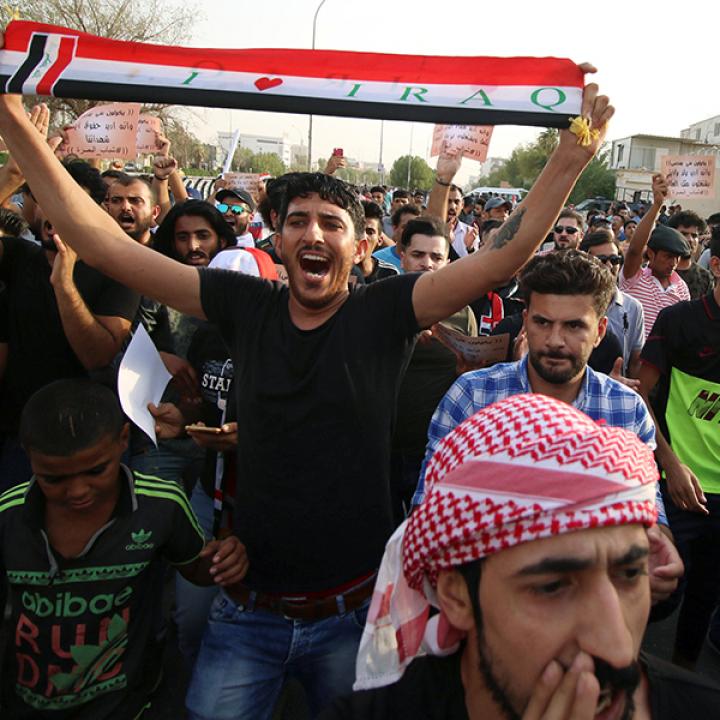

With protests originally sparking in July 2018, Basra continues to experience sporadic demonstrations.
While many protesters initially emphasized the continuing lack of infrastructure in southern Iraq, slogans against Iran, and attacks against the Iranian consulate have emphasized frustration at Iran’s influence in the region as well. Iran’s influence is directly visible to these protesters, and is especially discernible in the attacks on protesters by Iraq’s Iranian-backed militias. These attacks highlight the complicated relationship between Iraq’s powerful militias—which predominantly recruit from south of Iraq—and the south itself.
Militias have been a fact of life throughout post-2003 Iraq, with many militias, including the Mahdi army and Kataib Hezbollah, fighting American forces during the U.S. invasion of Iraq. Muqtada al-Sadr’s rise, from leader of the Mahdi Army to political opposition leader to head of the political bloc to win the greatest number of seats in the recent Iraqi election, exemplifies the influence militias continue to have on daily life in Iraq.
However, these militias are also involved in larger regional dynamics: both the large Badr organization and Asaib Ahl al-Haq— Which was formerly affiliated with Mahdi army—have fought in Syria to support Bashar al-Assad’s regime.
The militias have especially increased their strength and control since the Islamic State’s (IS) seizure of Mosul in 2014 and the subsequent collapse of the Iraqi military. After the fall of the Iraqi city of Mosul to Islamic State in June 2014, Grand Ayatollah Ali al-Sistani called on volunteers to take up arms and take part in jihad against IS, greatly popularizing militias and civilians in the south. Their strength relative to the federal government’s own military eventually pushed the Iraqi government to legalize the Popular Mobilization Forces (PMF) in 2016. In the meantime, Iran has supplied the PMF with substantial financial resources and heavy weaponry. In addition, Iranian leaders have embedded themselves within a number of PMF militias, helping the militias fight Islamic State forces while giving them increased leverage into shaping Iraq’s domestic political future.
The Deputy Commander of the Iranian-backed PMF, Abu Mahdi al-Muhandis, said that Iran has provided significant financial support to the PMF. Moreover, Iraq has sent thousands of youths to Iran for weapons training so that they can fight IS when they return to Iraq, while Iran sent thousands of Iraqi fighters to Syria in 2012 to protect the Shiite holy shrines there and combat IS. Hadi al-Ameri, commander of Badr Organization, consistently uses these examples in the media to argue that Iran has played a vital role in Iraq alongside the PMF in fighting IS, as a way to emphasize Iran’s goodwill towards Iraq. However, it is clear that Iran is interested in obtaining greater overall control of Iraq through proxy-politicians in the Iraqi government.
Despite their strength, disparate militias in the PMF have widely variable relationships with different segments of the Iraqi civilian population. For instance, the Badr organization—Iraq’s largest and perhaps most famous militia—which was founded by Ayatollah Muhammad Baqr al-Hakim has a notorious reputation. Along with local reports of militias outside of the PMF umbrella killing three Christian women who worked in Basra international airport in 2005, a Christian man was again targeted and killed in 2016 for selling wine after Iraq’s parliamentary ban on alcohol. Meanwhile, drug smuggling across the border between Iran and Iraq has led to addictions among some Iraqi youths.
Yet many youths join militias because there is little power and weak security services in Iraq. Youths often join militias like the Badr Organization in order to gain support when facing personal challenges. Moreover, militias are authorized to carry weapons—a sign of prestige for many young Iraqi men. Militias take advantage of ignorance, hiring people with lower levels of education to fight and protect their headquarters.
Iran, which also attempted to influence the 2018 parliamentary elections, has had a significant impact on changing the demography of southern Iraq, flaring sectarians tension and facilitating the displacement of religious minorities to either northern Iraq or abroad. In the past few months, the militias have also detained scores of protesters who torched the Iranian consulate in Basra. Leveling accusations that protesters and activists are linked to the United States, Some militias pushed Iraqi forces to arrest activists and journalists. Those accused include Fatimah Al-Behadili—the manager of a local NGO called the Iraqi Al-Firdaws Society—and Riham Yacoub, a women’s rights activist. Due to these accusations, these women now receive daily threats.
Pressures from militia forces have even forced some Basrawi protesters to flee to Turkey to seek safety. Mohammed Jawad is an emblematic example. During the Basra protests he carried a poster of Mia Khalifa, a well-known Lebanese pornographic actress, to lampoon the reliability of the local government relative to her work. After receiving a number of threats, Jawad moved to Istanbul. The protesters Mohammed Qasim and Haider Laith—whom the author interviewed in both Basra and Turkey—have also fled to the Bolu province in northern Turkey after receiving verbal threats.
Today, many protesters in Basra see the militias as a threat to their lives, rather than the heroes of the fight against IS that their leadership would like to present them as. Yet their power remains in the south, and appears likely to continue in the near future.



